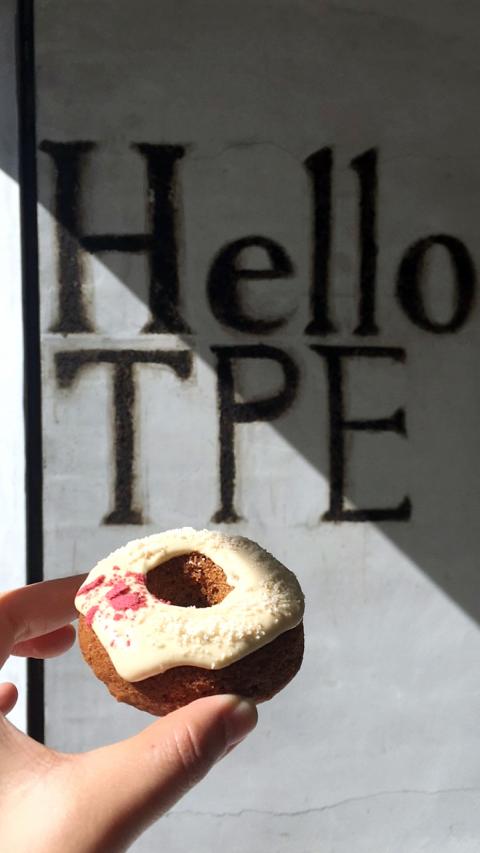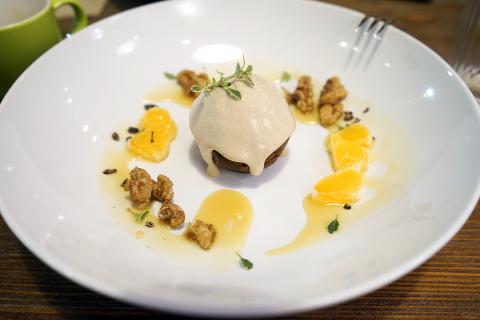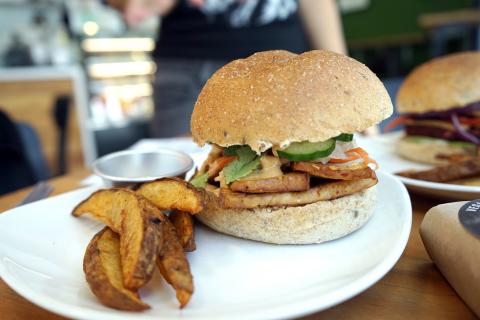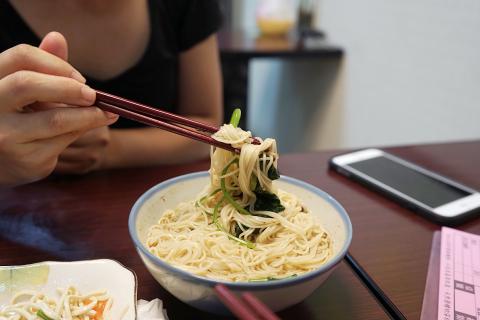In order to honor plant-based eating worldwide, People for the Ethical Treatment of Animals (PETA) nominated Taipei as Asia’s most vegan-friendly city in December 2016. A long tradition of Buddhism and a new vegan wave from the West have created an abundance of restaurants and cafes serving plant-based fare, vegan events and clothing brands.
A little more than a year ago, an expert panel of PETA staffers traveled throughout the continent and sampled vegan restaurants and street-food, judging cities on the number of vegan restaurants based on population, the variety of options available at non-vegan restaurants, the range of cuisines offered and the visibility of the local vegan movement. Since then, Taipei’s vegan scene has only been growing.
“Taipei’s vegan scene is the most dynamic in Asia, thanks to numerous restaurants that offer cutting-edge vegan meals and a powerful community of animal advocates,” Jason Baker, vice president of International Campaigns at PETA, said.

Photo courtesy of Mai Bach
Shi Hue-shou (釋慧守), a Buddhist monk from Austria who has been living at Kaohsiung’s Fo Guang Shan Monastery (佛光山) for 18 years, isn’t surprised Taipei won the award.
“Even here in Southern Taiwan you drive five minutes and will find a vegetarian canteen right around the next corner,” Shi said.
BUDDHISM

Photo courtesy of James Bell
Taiwan’s large Buddhist population is considered one of the main reasons why Taiwanese avoid meat.
“To be exact, there is no true law in Buddhism that says you cannot eat meat. But people believe that by eating less of it, you can become more compassionate and improve your karma,” Shi said.
Buddhism certainly plays a role when it comes to the abundance of vegetarian restaurants that Taiwan has to offer. Vegetarian hole-in-the-wall noodle shops and vegetarian buffets can be found in every population center, large or small.

Photo courtesy of Mai Bach
Health reasons, food allergies and skepticism toward the safety of food due to past food scandals are other reasons to go vegan.
VEGAN VS VEGETARIAN
There remains some confusion over the differences between vegan and vegetarian diets said Mayo Lai (賴孟君) a vegan actress, zero-waster and animal rights activist in Taipei.

Photo courtesy of James Bell
“It’s hard for people in Taiwan to understand the term vegan because we don’t really have an equal word for it,” Lai said.
Lai said that su (素) is the Chinese for vegetarian, which means dairy products and egg may be found in the meal. However, she added, over the past two years it has become so much easier to be a vegan in Taiwan.
“Slowly people are learning about this trend, that is actually a Western thing coming to Taiwan.”
According to HappyCow, which is a crowd-sourced review portal for vegans and vegetarians (www.happycow.net), there are more than 600 vegan and vegetarian restaurants in Taiwan. Taipei offers 57 restaurants that are completely plant-based and put a strong emphasis on health. Considering this number, Taipei can definitely compete with other Asian capitals, who have been praised for their vegan friendliness, such as Singapore,which offers 46 vegan restaurants, placing second in PETA’s ranking.
Taipei’s first plant-based restaurant, Ooh Cha Cha, celebrated its four-year anniversary in November last year and just recently opened a second store near the Technology Building in the city’s Daan District (大安). They get their vegetables and greens freshly delivered from a Taiwanese organic farmer.
“Our number one priority is educating people to understand the difference between junk food veganism and actual healthy vegan eating,” said Mai Bach, owner of Ooh Cha Cha.
They are also one of many businesses that partnered up with Green Monday, an initiative that started in Hong Kong and is part of a worldwide Meatless Monday movement. They encourage companies to go meatless for one day, which Green Monday said not only reduces 900,000 tons of CO2 emissions annually, but also saves up to 300 million animal lives per year.
Sidney Hsu (徐令軒), founder of Taiwan Vegan Frenzy, Taiwan’s first vegan fair, and its first vegan clothing label, Vnicorn, also sees a dynamism to Taipei’s vegan scene.
Hsu made the change from vegetarianism to veganism in 2014 because of her drive to protect animal rights and to live a more sustainable life.
“Vnicorn is 100 percent made in Taiwan and uses so-called mill-end fabrics. I hate waste, so my principle is to not create new demand but use leftover fabrics. Cutting down waste is my main priority.”
PROTECTING ANIMALS
The Taiwan Vegan Frenzy started coincidentally after a friend encouraged Hsu to use her shared space in late 2015 to hold the first event. Since then the fair has been growing yearly and attracting up to 3,000 visitors by promoting local vegan enterprises.
Usually hosted three to four times a year, locations alternate between Taipei and Taichung to get both north and central Taiwan familiar with the vegan lifestyle and more sustainable options.
Environmentally friendlier soaps, shampoos, as well as vegan dog food are some of the things that you can find at Plants, a restaurant that is run by Taiwanese filmmaker Square Jao (饒孟蓁) and her partner. They also offer workshops and talks on vegan topics.
James Bell, a vegan blogger from New Zealand, has traveled throughout Asia and can relate to PETA’s choice of cities.
“It really depends on how you define vegan-friendly... I think in some ways it’s incredibly fortunate to be based in Taipei, in other ways I wish there was more accessibility to vegan and vegetarian products in supermarkets, such as imported goods, which you can find in abundance in Hong Kong.”
For many, veganism has become a lifestyle that is not just about the mere absence of animal products. It is also about cultivating a life that is more sustainable and friendlier to the environment and animal life.
“If we want to change, we need to feel good doing it. If we don’t feel good, it’s not going to stick. Right now, what I see with veganism and with movements like Zero Waste and Upcycling are people feeling positive about these changes,” Bell said.

Towering high above Taiwan’s capital city at 508 meters, Taipei 101 dominates the skyline. The earthquake-proof skyscraper of steel and glass has captured the imagination of professional rock climber Alex Honnold for more than a decade. Tomorrow morning, he will climb it in his signature free solo style — without ropes or protective equipment. And Netflix will broadcast it — live. The event’s announcement has drawn both excitement and trepidation, as well as some concerns over the ethical implications of attempting such a high-risk endeavor on live broadcast. Many have questioned Honnold’s desire to continues his free-solo climbs now that he’s a

As Taiwan’s second most populous city, Taichung looms large in the electoral map. Taiwanese political commentators describe it — along with neighboring Changhua County — as Taiwan’s “swing states” (搖擺州), which is a curious direct borrowing from American election terminology. In the early post-Martial Law era, Taichung was referred to as a “desert of democracy” because while the Democratic Progressive Party (DPP) was winning elections in the north and south, Taichung remained staunchly loyal to the Chinese Nationalist Party (KMT). That changed over time, but in both Changhua and Taichung, the DPP still suffers from a “one-term curse,” with the

Jan. 26 to Feb. 1 Nearly 90 years after it was last recorded, the Basay language was taught in a classroom for the first time in September last year. Over the following three months, students learned its sounds along with the customs and folktales of the Ketagalan people, who once spoke it across northern Taiwan. Although each Ketagalan settlement had its own language, Basay functioned as a common trade language. By the late 19th century, it had largely fallen out of daily use as speakers shifted to Hoklo (commonly known as Taiwanese), surviving only in fragments remembered by the elderly. In

William Liu (劉家君) moved to Kaohsiung from Nantou to live with his boyfriend Reg Hong (洪嘉佑). “In Nantou, people do not support gay rights at all and never even talk about it. Living here made me optimistic and made me realize how much I can express myself,” Liu tells the Taipei Times. Hong and his friend Cony Hsieh (謝昀希) are both active in several LGBT groups and organizations in Kaohsiung. They were among the people behind the city’s 16th Pride event in November last year, which gathered over 35,000 people. Along with others, they clearly see Kaohsiung as the nexus of LGBT rights.